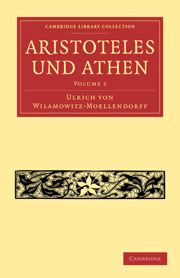Book contents
- Frontmatter
- Contents
- ZWEITES BUCH. Untersuchungen auf grund der aristotelischen Politie
- 1 Die quellen der griechischen geschichte
- 2 Die athenische politie von Kekrops bis Solon
- 3 Die athenische politie von Peisistratos bis Ephialtes
- 4 Πάτϱιoς πολιτεία
- 5 Die könige von Athen
- 6 Trittyen und Demen
- 7 Der athenische name
- 8 Der Areopag vor Ephialtes
- 9 3000 hopliten von Acharnai
- 10 Diobelie
- 11 Tιμήματα παρεχόμενοι
- 12 Λόγος und εὔϑυνα
- 13 Προχειροτovία
- DRITTES BUCH. Beilagen
- Sachregister
12 - Λόγος und εὔϑυνα
Published online by Cambridge University Press: 10 November 2010
- Frontmatter
- Contents
- ZWEITES BUCH. Untersuchungen auf grund der aristotelischen Politie
- 1 Die quellen der griechischen geschichte
- 2 Die athenische politie von Kekrops bis Solon
- 3 Die athenische politie von Peisistratos bis Ephialtes
- 4 Πάτϱιoς πολιτεία
- 5 Die könige von Athen
- 6 Trittyen und Demen
- 7 Der athenische name
- 8 Der Areopag vor Ephialtes
- 9 3000 hopliten von Acharnai
- 10 Diobelie
- 11 Tιμήματα παρεχόμενοι
- 12 Λόγος und εὔϑυνα
- 13 Προχειροτovία
- DRITTES BUCH. Beilagen
- Sachregister
Summary
Da wir jung waren, lernten und glaubten wir, dass die überlegenheit der Boeckhschen altertumswissenschaft über die Hermannsche philologie sich nirgend glänzender offenbare als in der abhandlung über euthynen und logisten, die zu diesem nachweise geschrieben ist. da wir älter wurden, sahen wir mit überraschung, dass Hermanns conjecturen zu CIA I 32 auf dem steine standen mit ausnahme von einer minder wichtigen stelle, wo Boeckh aber auch nicht richtiger geurteilt hatte. und nun stellt sich heraus, dass uber die sache beide irr gegangen sind, dass auch gerade die behandlung, die am meisten methodisch vorgieng und allein wirklich vorwärts kam (Schöll de synegoris), irr gehn musste, weil ihr fundament ein gefälschtes zeugnis war. die unzulänglichkeit unseres combinirens ungenügender daten zeigt sich handgreiflich, ebenso aber, dass die wirkliche kenntnis der sprache in ihrem gebiete mit sicherheit vorgeht und dass ihr die logik des rechtlichen gedankens auch wol zu hilfe kommen kann: beide vereint hätten das falsche zeugnis wol entlarven und aus dem sprachgebrauche und dem rechte der wahrheit näher kommen können. aber diese ist uns jetzt durch Aristoteles (48, 3–5. 54, 2) gegeben: wir wollen bei der sache bleiben, von den modernen absehn und auch die angaben der lexicographen, die aus Aristoteles abgeleitet oder durch misverständnis seiner worte entstanden sind, sollen fortfallen.dagegen mag was ihn ergänzt und ohne weiteres sich einordnet, gleich mit vorgeführt werden: wir wissen ja, dass er nur der reinste und reichste canal derselben überlieferung vom attischen staate ist.
- Type
- Chapter
- Information
- Aristoteles und Athen , pp. 231 - 251Publisher: Cambridge University PressPrint publication year: 2010First published in: 1893



